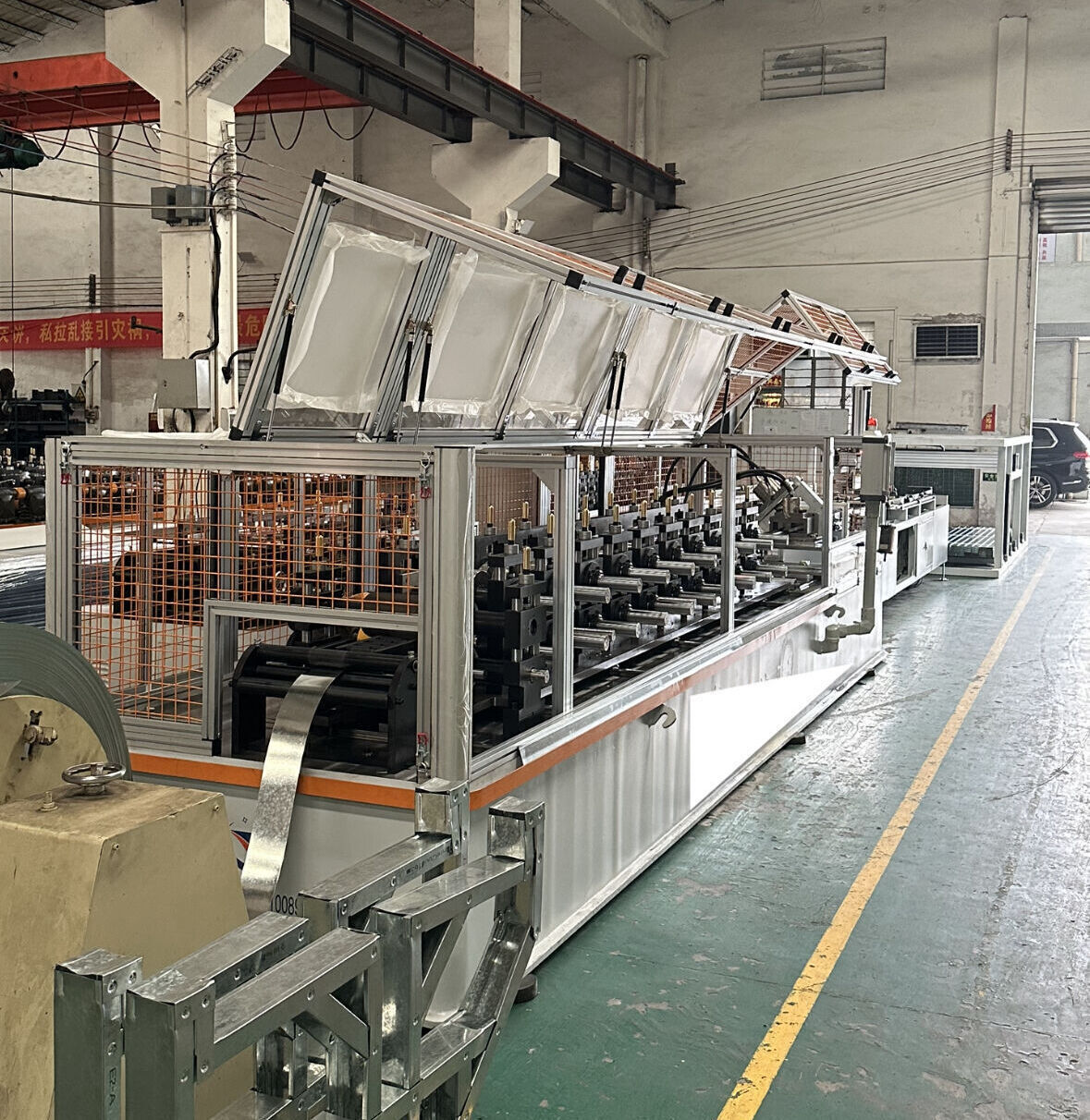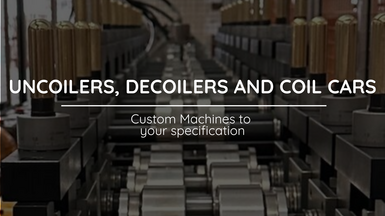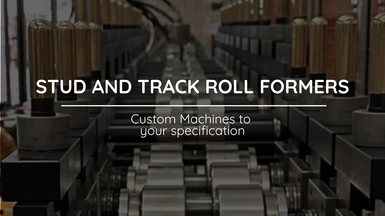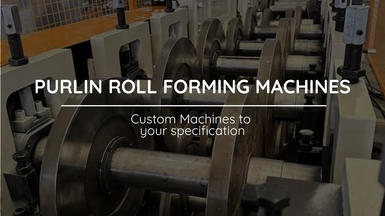
Stationary vs Portable Roll Forming Machines
Here's a comparison of stationary and portable roll forming machines:
Posted on Tuesday, November 28, 2023
Stationary and portable roll forming machines are both used in the metalworking industry for shaping and forming metal sheets into specific profiles or shapes. Each type of machine has its advantages and disadvantages, and the choice between them depends on the specific needs of a project and the available workspace. Here's a comparison of stationary and portable roll forming machines:
- Mobility:
- Stationary Roll Forming Machine: These machines are large, heavy, and designed to be permanently installed in a workshop or factory. They are not easily moved and require a dedicated workspace.
- Portable Roll Forming Machine: Portable machines are designed to be more mobile. They are often mounted on wheels or a trailer, making them easier to transport to different job sites. This mobility is especially useful for on-site projects.
- Space Requirements:
- Stationary Roll Forming Machine: These machines typically require a dedicated and spacious area in a factory or workshop. They may need more floor space and often have higher ceiling requirements due to their size and complexity.
- Portable Roll Forming Machine: Portable machines are more compact and can be set up in smaller spaces. They are suitable for projects with limited space availability.
- Setup and Installation:
- Stationary Roll Forming Machine: Installation and setup of stationary machines can be more time-consuming and may require professional assistance. Once installed, they remain in place for extended periods.
- Portable Roll Forming Machine: Portable machines are relatively easy to set up and can be operational quickly. They do not require permanent installation, which can save time and effort.
- Production Volume:
- Stationary Roll Forming Machine: Stationary machines are often larger and more robust, making them suitable for high-volume production runs. They can handle heavy-duty materials and complex profiles efficiently.
- Portable Roll Forming Machine: Portable machines are generally smaller and may not be as suitable for high-volume production as stationary machines. They are better suited for smaller projects or when mobility is a priority.
- Cost:
- Stationary Roll Forming Machine: Stationary machines tend to be more expensive both in terms of initial purchase and installation costs. They are a significant investment for a manufacturing facility.
- Portable Roll Forming Machine: Portable machines are typically more affordable and have lower installation costs. They are a cost-effective choice for contractors and businesses that need flexibility and mobility.
In summary, the choice between a stationary and portable roll forming machine depends on factors such as the nature of the projects, available workspace, production volume, and budget constraints. Stationary machines are better suited for high-volume production in a fixed location, while portable machines offer flexibility and mobility for on-site work and smaller projects.
What is a heavy duty Stationary Roll Forming Machine
A heavy-duty stationary roll forming machine is a specialized piece of industrial equipment used in metalworking and manufacturing processes to shape and form metal sheets into specific profiles or shapes. "Heavy-duty" in this context refers to machines that are designed to handle larger and thicker metal sheets, as well as perform continuous and high-volume production with precision and reliability.
Here are some key characteristics and features of a heavy-duty stationary roll forming machine:
- Robust Construction: Heavy-duty machines are built with sturdy and durable materials, such as heavy steel frames and components, to withstand the stress and wear associated with forming thicker and heavier metal sheets.
- High-Power Components: These machines are equipped with powerful motors, gearboxes, and drive systems to ensure they can efficiently process heavy-gauge materials. The drive system should be capable of providing sufficient torque and power to shape the metal effectively.
- Wide Range of Profiles: Heavy-duty stationary roll formers are versatile and can be configured to produce a wide variety of metal profiles, including complex shapes, channels, angles, and more.
- Multiple Stations: They often have multiple forming stations, each with its own set of rollers and tooling, allowing for the sequential forming of the desired profile. This can include processes like roll forming, punching, cutting, and bending.
- Precision Control: Heavy-duty machines are equipped with advanced control systems that enable precise adjustments of roller positions, speeds, and pressure to ensure accurate and consistent forming of the metal sheets.
- High Production Capacity: These machines are designed for continuous and high-volume production, making them suitable for industries and applications that require a large number of formed parts.
- Safety Features: Safety measures are essential, given the power and complexity of heavy-duty roll formers. They typically have safety guards, emergency stop buttons, and other safety features to protect operators.
- Customization Options: Manufacturers often offer customization options to tailor the machine's specifications to the specific needs of the customer, including the types of profiles to be formed and the dimensions of the metal sheets.
Heavy-duty stationary roll forming machines are commonly used in industries such as construction, automotive manufacturing, aerospace, and more, where the production of large and sturdy metal components is required. These machines are a significant investment but can offer high efficiency, precision, and reliability in metal forming processes.
What is a portable roll forming machine
A portable roll forming machine is a compact and mobile piece of equipment used in the metalworking and construction industries to shape and form metal sheets into specific profiles or shapes. Unlike stationary roll forming machines, which are large and permanently installed in a workshop or factory, portable roll forming machines are designed to be easily transported to different job sites, making them ideal for on-site projects. Here are some key characteristics and features of portable roll forming machines:
- Mobility: Portable roll forming machines are designed to be lightweight and often come with built-in wheels or can be mounted on a trailer. This mobility allows them to be easily transported to construction sites or remote locations where metal components are needed.
- Quick Setup: These machines are designed for fast and straightforward setup, minimizing downtime at the job site. They can be operational quickly, making them suitable for projects with tight schedules.
- Versatility: Portable roll forming machines can typically handle a range of metal materials, including steel, aluminum, and copper, as well as various thicknesses and gauges. They can be configured to produce a variety of profiles, such as roofing panels, siding, gutters, and more.
- On-Site Customization: One of the significant advantages of portable roll forming machines is their ability to produce custom lengths of metal profiles directly at the job site. This eliminates the need for transporting pre-formed metal components and reduces material waste.
- User-Friendly Controls: These machines often come with user-friendly control panels that allow operators to adjust settings such as roller positions, speeds, and other parameters to achieve the desired profile.
- Cost-Effective: Portable roll forming machines are generally more cost-effective than their stationary counterparts, both in terms of initial purchase and installation costs. They can offer significant savings for contractors and businesses that need flexibility and mobility.
- Safety Features: Safety is a priority, and portable roll forming machines are equipped with safety guards, emergency stop buttons, and other safety features to protect operators during operation.
- Durability: While portable, these machines are still built to withstand the rigors of the job site. They are constructed with durable materials and components to ensure long-lasting performance.
Portable roll forming machines are commonly used in the construction of metal buildings, roofing and siding installation, gutter and downspout fabrication, and various other applications where custom metal profiles are needed on-site. Their mobility and versatility make them a valuable tool for contractors and construction professionals looking to streamline their metalworking processes.
Roll Forming Machines LLC's New Factory
Posted on Sunday, March 23, 2025
We have relocated factories, which will be available for tours very soon.

Uncoiler, Decoiler and Coil Car Roll Forming Machine Accesories from Roll Forming Machines LLC
Posted on Sunday, November 24, 2024
Contact us today with your specifications for a custom Uncoiler, Decoiler or Coil Car at sales@rollformerusa.com or call us at (+1) (407) 859 1119

Stud and Track Roll Forming Machines from Roll Forming Machines LLC
Posted on Saturday, November 23, 2024
Contact us today with your specifications for a custom Stud and Track Machine at sales@rollformerusa.com or call us at (+1) (407) 859 1119

Cee and Zee Purlin Roll Forming Machines from Roll Forming Machines LLC
Posted on Saturday, November 23, 2024
Contact us today with your specifications for a custom Cee and Zee Purlin Machine at sales@rollformerusa.com or call us at (+1) (407) 859 1119